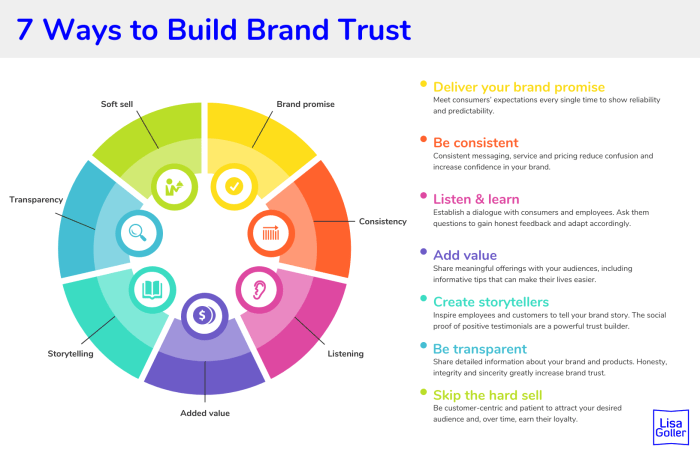Building Brand Trust sets the stage for this captivating journey, offering a sneak peek into the world of establishing trust with consumers in a modern, engaging way.
In the realm of business success, trust is the currency that drives loyalty and sales, making it a vital component for companies looking to thrive in today’s competitive landscape.
Importance of Building Brand Trust
Building brand trust is crucial for businesses as it helps establish credibility and reliability in the eyes of consumers. When customers trust a brand, they are more likely to make repeat purchases, recommend the brand to others, and remain loyal even in the face of competition.
Examples of Successful Companies
- Apple: Apple has built a strong brand trust through its innovative products, quality customer service, and consistent brand messaging. This has led to a loyal customer base and high sales figures.
- Amazon: Amazon’s focus on customer satisfaction, quick delivery, and a seamless shopping experience has earned the trust of millions of customers worldwide, resulting in increased sales and market dominance.
- Nike: Nike’s commitment to quality products, social responsibility, and empowering athletes has helped them build a trusted brand that resonates with consumers, leading to brand loyalty and strong sales performance.
Impact on Customer Loyalty and Sales
Brand trust plays a significant role in customer loyalty and sales. When customers trust a brand, they are more likely to choose that brand over competitors, become repeat customers, and advocate for the brand through word-of-mouth recommendations. This ultimately leads to increased sales, profitability, and long-term success for businesses.
Strategies for Building Brand Trust

Building brand trust with consumers is essential for the success of any business. Here are some strategies that companies can use to establish and maintain trust with their audience.
Traditional Methods vs. Modern Approaches
- Traditional Methods:
- Consistent branding: Using the same logo, colors, and messaging over time to build recognition and credibility.
- Quality products/services: Providing high-quality offerings that meet or exceed customer expectations.
- Word of mouth: Leveraging positive customer reviews and referrals to build trust among new customers.
- Modern Approaches:
- Social media engagement: Interacting with customers on social platforms to build relationships and demonstrate transparency.
- Content marketing: Creating valuable and relevant content to educate and engage customers, showcasing expertise and building credibility.
- Influencer partnerships: Collaborating with influencers or brand ambassadors to reach new audiences and build trust through association.
Creating Authentic and Transparent Brand Messaging
- Be honest and transparent: Communicate openly about your products, services, and business practices to build trust with consumers.
- Showcase your values: Highlight your company’s values and mission to connect with like-minded customers and build trust based on shared beliefs.
- Listen and respond: Actively listen to customer feedback and address concerns promptly to show that you value their opinions and are committed to their satisfaction.
Building Brand Trust Online

In today’s digital age, businesses face unique challenges when it comes to building brand trust online. With the rise of social media, online reviews, and influencer partnerships, companies must navigate a complex landscape to establish credibility and loyalty with their target audience.
Role of Social Media
Social media plays a crucial role in building brand trust online. Platforms like Facebook, Instagram, and Twitter allow businesses to engage directly with consumers, showcase their products or services, and address customer concerns in real-time. By maintaining an active and authentic presence on social media, companies can build transparency and credibility, ultimately fostering trust with their audience.
Role of Online Reviews
Online reviews have become a cornerstone of building brand trust in the digital age. Consumers heavily rely on platforms like Yelp, Google Reviews, and Amazon ratings to gauge the reputation and reliability of a brand. By actively monitoring and responding to online reviews, businesses can demonstrate a commitment to customer satisfaction and showcase their willingness to address feedback, both positive and negative.
Role of Influencer Partnerships
Influencer partnerships have emerged as a powerful tool for building brand trust online. Collaborating with influencers who align with a brand’s values and target audience can help companies reach new customers and build credibility through authentic endorsements. By leveraging the reach and influence of social media personalities, businesses can establish trust and credibility with their followers, driving brand loyalty and engagement.
Examples of Successful Online Brand Trust-Building Campaigns
– Nike’s partnership with athletes like Serena Williams and LeBron James to promote inclusivity and empowerment.
– Airbnb’s “Superhost” program, highlighting top-rated hosts to build trust and credibility within the community.
– Dove’s “Real Beauty” campaign, challenging beauty standards and promoting self-acceptance to connect with consumers on a deeper level.
Maintaining Brand Trust
Once brand trust has been established, it is crucial for companies to maintain it through consistent and integrity-driven practices. Building trust takes time and effort, but preserving it requires ongoing dedication and vigilance.
Best Practices for Maintaining Brand Trust, Building Brand Trust
- Consistency in messaging and actions across all touchpoints to reinforce brand values.
- Transparency in communication to build credibility and trust with customers.
- Quality assurance to ensure that products and services meet or exceed customer expectations.
- Excellent customer service to address any issues promptly and effectively.
Importance of Consistency and Integrity
Consistency and integrity are key components in maintaining brand trust as they help establish predictability and reliability in the eyes of consumers. When a company consistently delivers on its promises and upholds its values with integrity, customers are more likely to trust the brand and remain loyal.
Recovering from a Trust-Damaging Event
“In times of crisis, transparency, accountability, and swift action are essential for rebuilding brand trust.”
When a trust-damaging event occurs, companies must act quickly to address the issue, take responsibility, and communicate openly with stakeholders. By acknowledging mistakes, making amends, and implementing corrective measures, brands can begin the process of rebuilding trust with their audience.
